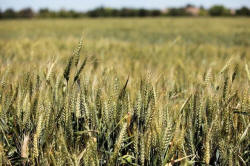Trade spat with Mexico speeds U.S. decline as global
wheat supplier
 Send a link to a friend
Send a link to a friend
 [July 26, 2018]
By Karl Plume and David Alire Garcia [July 26, 2018]
By Karl Plume and David Alire Garcia
CHICAGO/MEXICO CITY (Reuters) - Mexican
bread, pasta and flour-tortilla makers are seeking alternative suppliers
of wheat to reduce their dependence on the United States as trade
relations between the two neighbors deteriorate.
Mexico, the top importer of U.S. wheat, is increasingly turning to
cheaper supplies from Russia, which surpassed the United States as the
top global wheat supplier in 2016.
Now the U.S. market share decline is accelerating as Mexico casts about
for more alternative suppliers in Latin America and elsewhere to hedge
against the risk that U.S. grains will get more expensive if the Mexican
government imposes tariffs, according to interviews with three large
Mexican millers, international grains traders, the top Mexican
government agricultural trade official and government and industry data
analyzed by Reuters,
"It's important to send signals to Mr. Trump," said Jose Luis Fuente,
head of Canimolt, a Mexican trade group which represents 80 percent of
Mexican millers. Mexico will keep buying American wheat because of its
proximity, he said, but "we can't continue to have this absolute
dependence."

The shifting supply deals are alarming for the U.S. industry, which has
supplied the vast majority of Mexico's wheat since the 1994 North
American Free Trade Agreement (NAFTA) took effect.
U.S. wheat exports to Mexico dropped 38 percent in value, to $285
million, in the first five months of 2018. U.S. wheat exports to all
countries, valued at $2.2 billion, dropped 21 percent.
(For a graphic detailing the decline in U.S. wheat exports, see:
https://tmsnrt.rs/2Knz89c )
"The Mexico market ought to be just an extension of our domestic
market," said Justin Gilpin, CEO of the Wheat Commission in Kansas, the
nation's biggest wheat-producing state.
Instead, Mexican buyers plan to import as much as 100,000 tonnes from
Argentina - worth about $20 million based on current prices - when it
harvests wheat later this year, Fuente told Reuters. Mexico imported a
test cargo of 33,000 tonnes in late 2017 after the its government
financed a trade mission of grain buyers to find alternatives to U.S.
wheat in Latin America.
That same mission also resulted in Mexico raising its corn imports from
Brazil, at the expense of sales from the United States. Mexico imported
10 times more corn from Brazil in 2017 than the previous year, and is on
course to buy more this year.
Shortly after that trip, Mexico finalized pest-and-pathogen import
clearances to allow shipments of wheat from Argentina, which until then
had been forbidden.
The White House and the U.S. Department of Agriculture did not respond
to repeated requests for comment on how the nation's trade policy might
be accelerating the decline of its wheat industry. The Office of the
U.S. Trade Representative declined to comment.
The administration of U.S. President Donald Trump signaled its long-term
commitment to tariffs this week when it announced that it would tap a
Great Depression-era program for up to $12 billion in aid to help U.S.
farmers hurt by the trade war that Trump started.
PAYING A PREMIUM
Global grain merchant Bunge, which runs one of the largest milling
operations in Mexico, booked the Argentine wheat purchase together with
seven other buyers - even though it cost $1 or $2 more per tonne than
U.S. wheat, Fuente said.
Bunge declined to comment.
The buyers included Grupo Trimex, Harinas Elizondo, Molino Harinero San
Blas, Harinera Anahuac, Harinera Los Pirineos, Harinera El Paraiso and
Harinera Tlalnepantla. They all wanted to test the quality of the
imports, Fuente said.
Grupo Trimex, Harinera Anahuac, Harinera Los Pirineos and Harinera El
Paraiso did not respond to requests for comment. Molino Harinero San
Blas and Harinera Tlalnepantla declined to comment.
Manuel Iriso, CEO of Harinas Elizondo, which operates three flour mills
in central Mexico, said the company was seeking the best quality wheat
at the lowest cost, a goal it could achieve with a more diverse list of
suppliers.
"We want the biggest number of options," Iriso told Reuters.
MORE TRADE MISSIONS
Senior Mexican government officials are planning a trade mission to
Argentina this week, timed to coincide with the G20 Agriculture
Ministerial Meeting, a source familiar with the planning told Reuters.
It will mark the third such grains-focused visit in about a year.
[to top of second column] |

An early crop of wheat is seen in the spring in the Central Valley
in Davis, California, U.S., May 1, 2017. REUTERS/Hyungwon Kang/File
Photo

Argentina's effort to take a piece of the Mexico wheat market remains tentative
and faces challenges in competing on price, said David Hughes, president of
Argentine wheat industry chamber Argentrigo.
But with the country's wheat now approved for import and the next crop nearly
planted, "We are all set to sell to Mexico," he said.
Mexico will have its own logistic struggles in weaning itself off U.S. supplies,
said Raul Urteaga, the head of international trade for Mexico's agriculture
ministry, who confirmed the nation's effort to expand supplies from Argentina.
"In the near term, it won't be quick or easy to substitute the existing
logistics or (U.S.) import volumes, which are gigantic," he said. "All of our
infrastructure, both shipping and via trains, has been operating this way over
for some 40, 50 years."
But the need for alternative supplies is becoming more pressing as U.S. farmers
are nearly finished gathering their winter-wheat crop, and the spring harvest
approaches with no sign that the two countries will come to terms in a volatile
renegotiation of NAFTA.
Mexican officials threatened to impose tariffs on U.S. grains last month if the
trade conflict escalates. Mexico has already hit U.S. imports of steel, apples
and pork in retaliation after Trump imposed tariffs on Mexican metal exports.
If Mexico taxes U.S. wheat imports, Russian and other alternative wheat supplies
would be even more attractive for Mexican buyers.
During the first three months of this year, Russian and Ukrainian wheat exports
to Mexico totaled 243,000 tonnes - or nine times more than the same period in
2017, according to Canimolt data, making the Black Sea region's wheat farmers
the biggest new source of imports for Mexican millers.

EXPLOITING OPPORTUNITIES
U.S. hard red winter wheat, priced at $240 per tonne or more, is competing with
wheat from Russian and the upcoming Argentine harvest - offered at between $202
to $208 per tonne. That more than offsets the higher cost of shipping wheat from
great distances.
Unexpected increases in U.S. rail costs have also made shipping wheat to Mexico
more expensive.
The Mexican wheat industry "has an agility to exploit opportunities when they
arise, whether they come in the form of Russian, Ukrainian, French or Argentine
wheat," said Alejandra Ruiz-Rocha, wheat trading manager in Mexico for Cargill
Inc [CARG.UL].
High-protein Canadian wheat is also gaining appeal. Mexican millers often blend
Canadian spring wheat with low-protein wheat from the Black Sea region,
producing a cost savings over U.S. wheat, said a Canadian grain trader who was
not authorized to speak publicly.
LOSING A 'NATURAL MARKET'
The loss of the Mexican market is hurting U.S. farmers in states like Kansas,
where a severe drought slashed output this year. In the town of Chapman, in
central Kansas, farmer Ken Wood said that prices dropped by 50 to 60 cents per
bushel in a week late last month as farmers harvested their crops amid export
market uncertainty.
"It's frustrating. Mexico's a natural market for us," he said. "Break-even might
be our best hope this year."
Even if U.S. wheat regains its historic price advantage over more distant
countries, some Mexican demand may already be lost.
Ailil Delgado, the owner of Panefilos, an artisanal bread shop in Guadalajara,
said she would be willing to pay more for flour free of American wheat. Her
customers, too, would accept higher bread prices to express their anger over
U.S. trade and immigration policies, she said.
"I would definitely pay a higher price so long as quality standards are met,"
Delgado said, "and specifically as a way to teach Trump a lesson."
(Additional reporting by Sharay Angulo and Suman Naishadham in Mexico City, Hugh
Bronstein in Buenos Aires, Michael Hirtzer in Chicago, Polina Devit in Moscow
and Rod Nickel in Winnepeg; Editing by Simon Webb and Brian Thevenot)
[© 2018 Thomson Reuters. All rights
reserved.] Copyright 2018 Reuters. All rights reserved. This material may not be published,
broadcast, rewritten or redistributed.
Thompson Reuters is solely responsible for this content. |